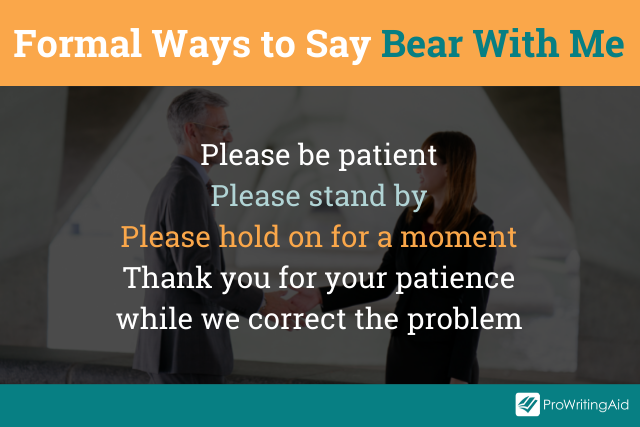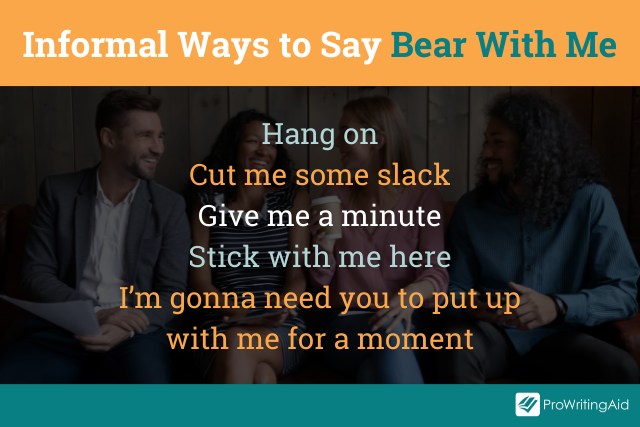
Sometimes we need people to be patient with us. So we say “please, just bear with me.” Or maybe we say “please, just bare with me.” Which spelling is correct: bear or bare?
The words bear and bare are homophones: words that sound alike but are spelled differently and have different meanings.
“Bear with me” means “please have some patience with me.”
“Bare with me” literally translates to “uncover with me.” Imagine sending that request to your boss! Even if they recognize your intended meaning... awkward.
If you’re saying bear with me, no one will know whether you’ve got the spelling wrong, but if you’re writing the request, you need to get it right.
Bear With Me vs. Bare With Me: The Difference Explained
Bear and bare share pronunciations and include the same letters. It’s no wonder they cause confusion.
We’re all familiar with the noun form of bear. It’s the massive furry creature best viewed from afar.
When you say “bear with me,” you are using the verb bear. There are several meanings of the infinitive verb to bear.

In the context of “bear with me,” the verb bear means “to endure.” You’re asking people to endure, to stay with you.
Bare is a different story.
The infinitive verb to bare means “to uncover.”
Remember this: In all its forms, bare has to do with uncovering or being uncovered. You’ve probably heard the phrases “bare naked,” “I bared my soul,” “bare bones,” or the house was “stripped bare.”

Bear With Me Meaning
So, when you say bear with me, are you asking someone to endure you?
That might seem a little dramatic. Think of bear with as representing a less intense version of endure. You are asking someone to have patience with an inconvenience, or interruption in the action. Whether or not you’re the cause of the problem, you’re the face of it.
For example:
- You’re a bank teller and your computer crashes in the middle of a transaction. You say “please bear with me while I restart the system.”
- You’re delivering a speech and realize your pages are out of order. You say “bear with me while I get myself organized!”
- You started a new job and called someone by the wrong name. You say, “please bear with me as I learn your names!”
Asking someone to bear with you is asking them for patience while you get things sorted.
Other Ways to Say “Bear With Me”
You can use bear with me in both serious and light-hearted situations. The example phrases below are synonymous with “bear with me.”
We have categorized them into formal and informal phrases.

Formal ways to say bear with me:
- Please be patient
- Please hold on for a moment
- Thank you for your patience while we correct the problem
- Please stand by

Informal ways to say bear with me:
- I’m gonna need you to put up with me for a moment
- Cut me some slack
- Give me a minute
- Hang on
- Stick with me here
The formality and tone with which you say bear with me depends on your situation.
If you’re a doctor running behind schedule, your bear with me request to patients in the waiting room will be offered sincerely.
If you’re telling a long joke, forget the punchline and your friends yell at you, you’ll say “Okay, okay! Just bear with me” with a laugh.
Examples of Bear With Me Used in Sentences
The correct expression bear with me appears in print often. Sometimes, due to careless editing, you’ll encounter “bare with me” in print occasionally.
You know better now, but everyone makes mistakes.
No need to worry. ProWritingAid is your own personal editor. It has a homonym report designed to catch errors in words that sound alike, so you’ll never be embarrassed by accidentally asking readers to “uncover” with you.

“Economic policy in 2021 was actually pretty good…I can already hear the screaming, but bear with me for a bit”—The New York Times, Paul Krugman, The Economic Case for Goldilocks
“A third, more challenging but ultimately more satisfying way to make summer last longer: Adjust your outlook. Bear with me here for the logic.”—The New York Times, Alan Burdick Summer is a Scam: Here’s How to Fix It
“I know! I know what you’re thinking. But if you’re even mildly interested in both subjects, bear with me”—The Huffington Post, Nora Biette-Timmons, When ‘The Bachelor’ and the Democratic Primaries Collide
"Please bear with me as this newsletter evolves…”—The Atlantic, Conor Fredersdorf, A Better Conversation Than Social Media
Bear With Me Is the Correct Spelling
Some people find it helpful to think of a grizzly bear enduring the long winter in hibernation (doesn’t sound so bad to me!) to remind them that bear is the correct spelling in the phrase bear with me.
Others think of being emBARrassed by using the phrase bare with me.
The bottom line is this: in bear with me, bear is always the correct spelling.


